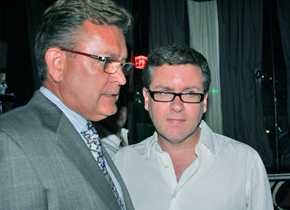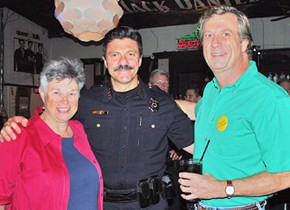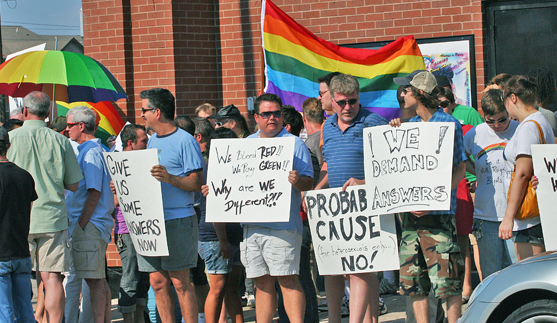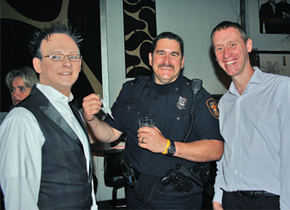Fort Worth community leaders, police officials look back at 12 months of change in the wake of the Rainbow Lounge raid
Tammye Nash | Senior Editor
nash@dallasvoice.com
What a difference a year makes.
On June 28, 2009, seven officers with the Fort Worth Police Department joined two agents from the Texas Alcoholic Beverage Commission in a raid on a newly-opened gay bar in Fort Worth called the Rainbow Lounge.
On June 28, 2010, the Fort Worth police were back at Rainbow Lounge. Only this time, instead of making arrests the officers were sharing a barbecue meal with community leaders and bar patrons and celebrating the progress the city has made over the last 12 months in improving the relationship between Fort Worth and its LGBT community.
And that progress, most in Fort Worth agree, has been remarkable.
Todd Camp, co-founder of Fort Worth’s Q Cinema LGBT film festival, was at the Rainbow Lounge celebrating his birthday with friends when the raid occurred. It was Camp, along with Chuck Potter, Thomas Anable and others, who used e-mail and social networking sites like Facebook to spread the word about the raid almost immediately.
They also put their outrage to work to organize two protests — one that Sunday afternoon outside the bar and a second later that evening outside the Tarrant County Courthouse — and to rally people to attend the next meeting of the Fort Worth City Council.
Camp said recently that he has been pleased to see the way that Fort Worth — its LGBT community, its police department and its city officials — have stepped up to the challenge and worked together not just to mend fences, but also break down barriers.
“I think, for me personally, the biggest accomplishment of the past year has been the fact that the city of Fort Worth has become aware that they have a gay community that has a voice with some emotion and power behind it, that it is a community that is willing to speak out when something is wrong,” Camp said.
“The City Council has stepped up to the plate and made a lot of fantastic changes. And there have been some really good changes in the police department, in the way they do business. It has really raised their [the police department’s] awareness,” Camp continued. “It took something going horribly wrong to open their eyes. But I feel like now, for the first time, the city and the police realize that there are gay people living here and that we are valuable members of society. … The city learned a lot about a vibrant part of its community.”
The incident has also, Camp said, raised awareness in the LGBT community.
“There was so much ignorance, and not just on the side of the city officials and law enforcement. It was on our side, too. We all learned a lot about the law, about what was acceptable and what was not acceptable.”
Police Chief Jeff Halstead agreed that both sides have learned valuable lessons from and about each other in the last year.
“We all decided to get past our emotions, and we’ve learned to respect each other’s feelings and opinions,” Halstead said. “And it’s definitely been a worthwhile investment for us all to make.”
The chief said he has seen a marked difference in the way the LGBT community responds to the police department since the raid occurred, and a difference in the way his officers see the LGBT community.
“I think people in the community feel like they have actually built friendships in the police department, and not just with [LGBT Liaison Officer Sara Stratten]. I think they feel like their ideas and opinions will be heard,” he said.
Halstead had been on the job as chief of the Forth Worth PD for less than a year when the Rainbow Lounge raid happened. And in his first public comments on the raid, Halstead told a reporter that patrons in the bar that night had made “sexually suggestive movements” toward the officers, and that he was proud of the restraint the officers had shown in the situation.
Halstead later apologized for his remarks, but not before the comments made him the focal point for much of the community’s anger and outrage. But at the barbecue this week, and when the chief attended a screening at the recent Q Cinema film festival, it was obvious that Halstead’s efforts to reach out to and understand the LGBT community had overcome the anger.
Camp said that “one of the greatest moments for me” of the last year came when Q Cinema previewed the recently-completed trailer for Robert Camina’s documentary, “Raid at the Rainbow Lounge.”
“[City Councilman] Joel Burns was in the audience, and Chief Halstead was there with his wife. There had been a lot of hand-wringing and worry over the trailer, because it focuses on the community’s immediate gut reaction to the raid. It’s kind of harsh, and [Camina] was a little bit worried about how the chief would react,” Camp said.
But Halstead took it all in stride, he said.
“I think it showed some tremendous courage for him to be there and see that trailer. He was painted as a villain early on, but he’s not a bad guy,” Camp said of Halstead. “He just had some learning to do, and he stepped up and was there and was supportive.

- STOPPING TO REMEMBER | Fairness Fort Worth President Thomas Anable, left, and Q Cinema co-founder Todd Camp were among the community leaders who attended a barbecue on Monday, June 28, at Rainbow Lounge to commemorate the anniversary of the 2009 raid on the bar and celebrate the progress the community has made over the last 12 months. Anable and Camp were both at Rainbow Lounge when the raid occurred, and both helped organize the community’s response. (Tammye Nash/Dallas Voice)

“I also think it says a lot that the chief of police was there for the opening night of an LGBT film festival,” Camp continued. “It meant a lot to everybody that he was there. … It’s a sign that things really are changing for the better.”
One of the first — and perhaps, most important — of those changes for the better came less than a month after the raid when Halstead announced that Fort Worth Officer Sara Straten had been appointed interim liaison to the LGBT community. By the end of the year, the appointment had been made permanent and Straten had been reassigned from her community patrol duties to the public information office.
Straten acknowledged recently that while she is glad to be the LGBT liaison officer, it hasn’t always been a smooth ride.
At first, Straten said, people in the LGBT community saw her as being too supportive of Halstead, a man they still saw as the enemy. But as time passed, both she and the chief have built not only solid working relationships within the community, but friendships as well.
There have been very concrete advances with the police department, Straten said, starting with the implementation of a new policy on bar checks that went into effect on Sept. 1 last year. The new policy specifies detailed steps for officers to follow, and designed to lessen the potentially adversarial relationship between officers, bar owners and staff and patrons.
Straten also praised the new diversity training implemented within the police department that puts more focus on LGBT issues than before. She said she and Gil Flores taught the first diversity training session, and that officers in the class “asked a lot of good questions.”
“The mayor and the chief both went through the training themselves about a month ago, and the chief was there at the first session,” she said.
Officers also participated in the Tarrant County Gay Pride Parade and Picnic last October, and the chief and his wife attended the picnic.
The atmosphere for LGBT officers within the department has improved significantly, too, Straten said.
Before she volunteered for the liaison position, Straten was not out at work. In fact, when she did step forward to volunteer, she became the first officially “out” officer on the force. Since then, a number of other officers have come out, but Straten says the credit for that goes to the chief’s leadership in creating a more comfortable and accepting atmosphere, and the individual officers’ courage in taking that step.

- FROM PROTEST TO PARTY | The Rev. Carol West, left, and David Mack Henderson, right, both of Fairness Fort Worth, are all smiles as they talk to Fort Worth Police Chief Jeff Halstead during a barbecue and meet-and-greet with police officers at the Rainbow Lounge on Monday, June 28, the one-year anniversary of the Rainbow Lounge raid. (Tammye Nash/Dallas Voice)

“Coming out is scary. But what kept me in the closet back then was as much my own stereotyping as anything else,” she said. “I do think there has been a shift [in attitudes within the police department], but I would never say that came from me. I think it’s more about a shift in the culture at large. The younger officers coming into the force are much more accepting in general, and that changes things for everybody.”
Halstead agreed that there has been a shift within the department.
“I think that more and more, officers are feeling like they can just be themselves, gay or not,” Halstead said. “It’s taken some time, but the improving relationship with the LGBT community is helping. With the proper training and with time, it will continue to improve.”
Perhaps one of the most significant changes over the past year has been the formation and continued growth of the organization Fairness Fort Worth. The group was formed in the days immediately following the raid initially to assist in finding witnesses who saw what happened that night, and to provide those witnesses with legal advice and support in giving their statements to investigators with the Fort Worth Police Department and TABC.
Now, said Anable, the group’s newly-elected president, FFW has branched out and is intent on becoming a permanent resource for the entire community, helping to coordinate between other organizations and serving as a clearinghouse for and point of contact between the LGBT community and the community at large.
Anable said the group has secured its status as a 501(c)(3) nonprofit organization, and organizers held their “first real strategic planning meeting” in January. FFW is also conducting a community survey that will allow the group to compile statistics on the Fort Worth LGBT community.
“We’ve never really had an organization in Tarrant County that was really plugged into the political process, one that is able to speak consistently with one voice,” Anable said. “We are actually doing, now, things that were only talked about before. We have the momentum and the commitment to move forward with things that have only been talked about for a decade.”
Although the Fort Worth community has “a cooperative spirit” and has accomplished goals in the past — like getting the city to pass a nondiscrimination ordinance protecting lesbians and gays — such efforts were always done quietly and in a somewhat piecemeal manner, Anable said.
But now, he added, “we have an organization that has depth and is permanent, something that won’t go away. We have lines of communication open now that we never had before. We have real credibility now. Now, they know we are a viable and valuable community.”
Members of FFW were among those who went to the Fort Worth City Council meetings following the raid. They stepped up to serve on the Diversity Task Force formed by the council that came up with a list of changes, most of which have been made already by city officials.
Among those was amending the city’s nondiscrimination ordinance to specifically protect transgender people as well as lesbians and gays. Two of the task force’s recommendations — domestic partner benefits for city employees and insurance coverage for city employees who undergo gender transition surgery — are still on the table, primarily because the city has to watch every penny during the ongoing economic crunch.
There are other plans in the works, too, Anable said, such as building an LGBT community center that would include a phone bank and a library.
And while the resources — and the need — for these advances have always existed within the community, it took what Anable called “the perfect storm” of the Rainbow Lounge raid to set the change in motion.
“It really was a perfect storm. It was the 40th anniversary of Stonewall; they were having the Stonewall anniversary march in Dallas; Todd [Camp] was there in the bar that night; I was there,” Anable said. “People saw what happened, and people were angry. And they were willing to do something about it.
“It’s amazing, really, everything that has happened,” he continued. “I mean, to go from where we were to where we are now in just 11 months — are you kidding me? It’s been amazing.”
This article appeared in the Dallas Voice print edition July 02, 2010.
















I nice little Bar-B-Que is fine but I personally wouldn’t trust the FW Police as far as I could throw their heaviest officer! Anything for a little “Southern Style” hypocritic publicity. Don’t be fooled folks!